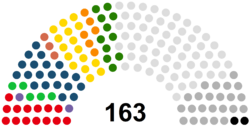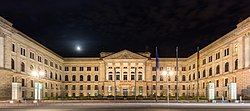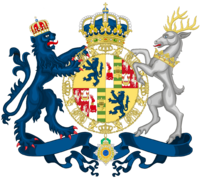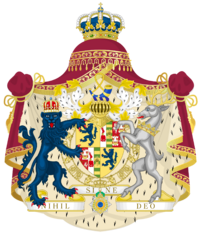Reichssenat: Difference between revisions
No edit summary |
mNo edit summary |
||
| (45 intermediate revisions by the same user not shown) | |||
| Line 4: | Line 4: | ||
| native_name = ''Maskillischer Reichssenat'' | | native_name = ''Maskillischer Reichssenat'' | ||
| logo_pic = Mascyllary Reichssenat logo.png | | logo_pic = Mascyllary Reichssenat logo.png | ||
| logo_res = | | logo_res = 250px | ||
| legislature = | | legislature = 233rd year of business | ||
| house_type = | | house_type = ''De facto'' {{wp|parliamentary system|upper house}} of the {{wp|legislature}} of [[Mascylla]] | ||
| houses = | | houses = | ||
| leader1_type = [[Reichssenat|President]] | | leader1_type = [[Monarchy of Mascylla|Monarch]] | ||
| | | leader1 = [[Dorothea I of Mascylla|Dorothy I]]<br>since 25 November 2005 | ||
| | | leader2_type = [[Reichssenat|President]] | ||
| | | leader2 = [[Egon Weidmann|The Viscount Weidmann of Wietzen]], formerly [[Social Democratic Party of Mascylla|SDP]]<br>since 2 March 2019 | ||
| leader3_type = Deputy President | |||
| leader3 = Lara Gohnich, formerly [[RU/ABP|RU]]<br>since 11 January 2022 | |||
| party2 = | | party2 = | ||
| election2 = | | election2 = | ||
| members = 163 | | members = 163 | ||
| house1 = | | house1 = | ||
| structure1 = | | structure1 = Composition of the Mascyllary Reichssenat, 2022.png | ||
| structure1_res = | | structure1_res = 250px | ||
| house2 = | | house2 = | ||
| structure2 = | | structure2 = | ||
| structure2_res = | | structure2_res = | ||
| political_groups1 = | | political_groups1 = | ||
'''{{colorbox|# | '''Chairing officers (2)'''<br> | ||
* | * {{colorbox|#000000}} President and Deputy President (2) | ||
* | '''[[First Falkner cabinet|Royal Government]] (34)'''<br> | ||
* | * {{colorbox|#1B4F72}} [[RU/ABP|Centre Party]] (20) | ||
* | ** {{colorbox|#1B4F72}} [[Rehunion]] (15) | ||
** {{colorbox|#38ACFF}} [[RU/ABP|Adwinian Citizens’ Party]] (5) | |||
* {{colorbox|#E60012}} [[Social Democratic Party of Mascylla|Social Democratic Party]] (14) | |||
* | '''Royal Opposition (43)''' | ||
* {{colorbox|#FFD800}} [[Liberal Party (Mascylla)|Liberal Party]] (16) | |||
* | * {{colorbox|#267F00}} [[National Democratic Union (Mascylla)|National Democratic Union]] (11) | ||
* {{colorbox|#FB8A00}} [[People's Party (Mascylla)|People's Party]] (6) | |||
* | * {{colorbox|#12C038}} [[The Greens (Mascylla)|The Greens]] (5) | ||
* {{colorbox|#D46A4C}} [[Free Voters (Mascylla)|Free Voters]] (3) | |||
* | * {{colorbox|#7661A5}} [[Social Reform Party (Mascylla)|Social Reform Party]] (2) | ||
'''Neutral (82)'''<br> | |||
* {{colorbox|#DDDDDD}} {{wp|Independent politician|Non-inscrits}} (61) | |||
* | * {{colorbox|#B2B2B2}} Non-affiliated (21) | ||
* | |||
'''{{colorbox|# | |||
* | |||
| political_groups2 = | | political_groups2 = | ||
| last_election2= | | last_election2= | ||
| next_election2= | | next_election2= | ||
| voting_system1 = | | voting_system1 = | ||
| voting_system2 = | | voting_system2 = | ||
| session_room = | | session_room = Cámara_Alta_de_Prusia,_Berlín,_Alemania,_2016-04-22,_DD_49-51_HDR.jpg | ||
| session_res = | | session_res = 250px | ||
| meeting_place = | | meeting_place = ''Reichssenat'' Building, [[Königsreh|Lorenz-Prinzwald]], [[Königsreh]], [[Mascylla]] | ||
| website = | | website = www.maskillischer-reichssenat.ma | ||
}} | }} | ||
{{Template:PoliticsofMascylla}} | |||
The '''''Reichssenat''''' (<small>{{wp|German language|Hesurian}} pronunciation</small>: {{wp|Help:IPA/Standard German|[ʁaɪ̯çse:na:t]}}, lit. ‘Senate of the Realm’) is the ''{{wp|de facto}}'' federal {{wp|parliament}} of the subnational divisions and {{wp|parliamentary system|upper house}} of the {{wp|legislature}} of [[Mascylla]]. The ''Reichssenat'' is a legislative body that represents the 21 [[Mascylla#Politics|''Reichsländer'' and ''Freie Städte'']], consisting of 163 members known as Representatives of the ''Reichssenat'' (''Repräsentanten des Reichssenats''; RdR) or ''{{wp|peerage|Paire}}''. | |||
Membership of the chamber is by appointment of the state government; a majority of the sitting members are {{wp|life peer|appointed}}, {{wp|hereditary peer|hereditary}}, and official noble {{wp|peerage|peers}} by virtue of their position, such as representatives of universities and cities, although the chamber also has {{wp|commoner|common}} members. The peers may include adult {{wp|prince|princes}} of the royal [[House of Ahnern]], members with hereditary right such as {{wp|duke|dukes}}, {{wp|marquess|marquesses}}, {{wp|count|counts}}, and {{wp|viscount|viscounts}}, holders of the major Court Appointments (''Hofämter'') such as the Lord Chamberlain (''Oberkämmerer''), the Lord Steward (''Oberhofmeister''), the Lord Marshal (''Obermarschall''), and the Lord Burgrave (''Oberburggraf''), peers appointed by the Monarch on the advice of the Prime Minister, and peers chosen by public representation. Therefore, the institution is often referred to as the '''Mascyllary House of Lords''' (''Maskillisches Herrenhaus'') by foreign legal scholars. | |||
The composition of the delegation varies depending on the state's population, the incumbent makeup of the state government, and the ruling majority (or coalition) of each state legislature, though they may or may not be publicly partisan. The chamber is able to operate at a minimum of 180 members, who are the peers with their guaranteed seats but can vary greatly in maximal size if needed to achieve popular {{wp|proportional representation}}. However, no assembly of the ''Reichssenat'' in history was solely comprised of noble representatives. | |||
During the [[Mascylla|War of the Five Kings]], the Reichssenat was the | During the [[Mascylla|War of the Five Kings]], the ''Reichssenat'' was the official assembly of the sovereigns and elected commoners of the states which were part of the [[Elbau Confederation]] (1793–1798). Since its establishment in 1789 under the [[Kingdom of Aldia]] in Augusthal, it has met in various locations, and today sits at the former Elbgau Council building in [[Königsreh]]. It is represented by the office of the President of the ''Reichssenat'' (''Präsident des Reichssenats''), currently occupied by [[Egon Weidmann|The Viscount Weidmann]] since 2019, of which its holder is directly elected by the ''Reichssenat'' itself. | ||
The ''Reichssenat'' is able to review and scrutinize {{wp|bill|federal and state law}} that was drafted by the [[Reichsrat (Mascylla)|''Reichsrat'']] without the ability to block their passing, but can significantly delay approval of the {{wp|legislation}} and consult the ''Reichsrat'' with advice and recommendation. Moreover, the members of the chamber cannot influence the Prime Minister nor their government, and traditionally do not take on positions as government ministers. The ''Reichsrat'' is defined within the [[Politics of Mascylla|political system of Mascylla]] as the only legislative institution by the [[Constitution of Mascylla|Constitution]] directly elected by the people of the country, but is, in essence, sharing its constitutional duties with the ''Reichssenat''. The chamber is the product of long-established {{wp|convention}} to {{wp|checks and balances|check and balance}} the ''Reichsrat'''s legislative power. | |||
==Tasks and duties== | ==Tasks and duties== | ||
=== | |||
Through the ''Reichssenat'', the states and free cities participate in federal legislation and administration and in matters relating to government policy and decision-making. The states, represented by their respective governments and legislatures, operate within the ''Reichssenat'' and are able to shape and influence the aforementioned fields, while the styles of such participation are not determined and therefore highly ambiguous. | |||
The [[Elbgau Confederacy|National Council]] (''Nationalrat'') in 1793 first proposed the name ''Länderkammer'' ('Chamber of States'), in tandem with the similarly proposed name ''Volkskammer'' ('Chamber of the People') for the ''[[Reichsrat (Mascylla)|Reichsrat]]'', but it was later rejected in favor of its current terminology. Still, nowadays the ''Reichssenat'' is referred to as a "second house" or "''Länderkammer''" and in some cases as a full-fledged {{wp|parliamentary system|upper house}} of legislature domestically and internationally. However, the ''Reichssenat'' is described as a sovereign constitutional body according to the constitution and is, in opposition to most countries, "not a second chamber of a uniform legislative body that would be set equal to the 'first chamber' regarding lawmaking." | |||
===Legislation=== | |||
====Consent and opposition laws==== | |||
===Exceptions=== | |||
===Other tasks and responsibilities=== | |||
==Organisation== | ==Organisation== | ||
===President and presidency=== | ===President and presidency=== | ||
{{multiple image|total_width = 300 | |||
| caption_align = center | |||
| image1 = Lammert,_Norbert-0829.jpg | |||
| caption1 = '''[[Egon Weidmann|The Viscount Egon Weidmann of Wietzen]]'''<br>{{small|President of the ''Reichssenat''}}<br>since 2019 | |||
| image2 = Pressefoto_2_Anne_Spiegel_11-15_nahe.jpg | |||
| caption2 = '''Lara Gohnich'''<br>{{small|Deputy President of the ''Reichssenat''}}<br>since 2022 | |||
}} | |||
The presidency is composed of the office of the President of the ''Reichssenat'' (''Reichssenatspräsident'') and one deputy president. According to uncodified tradition, the ''Reichssenat'' elects its president and vice president every two years; the two members of the ''Reichssenat'' are often voted unilaterally. They assume their offices beginning on the 1st of September every two years. If a president's position in the ''Reichssenat'' is revoked, their term as President of the ''Reichssenat'' ends as well. Their successor as a member of the ''Reichssenat'' succeeds them as president as well, diminishing fluctuations of people serving the office in face of changing party landscapes and political instability. Additionally, this enables every state and its members to be able to assume the presidency. Historically, the president had close political and hierarchical links to the monarchy, with the [[Monarchy of Mascylla|Monarch]] and the President ahead of the [[Prime Minister of Mascylla|Prime Minister]] in the constitutional {{wp|order of precedence}}. | |||
The President of the ''Reichssenat'' assumes the constitutional tasks and duties of a Monarch when unable to do so, either by abdication, medical treatment, or otherwise, and sets in motion the assembly of the Federal Convention and the Accession Council. While they serve as representative of the Monarch, their office as president remains vacant. For that instance, the vice president temporarily takes over the duties and tasks while the president is unable to do so themself. | |||
===Members and distribution of votes to the states=== | ===Members and distribution of votes to the states=== | ||
===Distribution of | {| class="wikitable" | ||
|- | |||
! State !! Population !! Votes<br><small>(number)</small> !! Votes<br><small>(visual)</small> !! Citizens per vote !! Government parties | |||
|- | |||
| {{flagicon image|FlagAdwhin.png}} Adwhin || 5,826,004 || 10 || {{colorbox|#710000}} {{colorbox|#710000}} {{colorbox|#710000}} {{colorbox|#710000}} {{colorbox|#710000}} {{colorbox|#710000}} {{colorbox|#710000}} {{colorbox|#710000}} {{colorbox|#710000}} {{colorbox|#710000}} || 582,600 || ABP, FB | |||
|- | |||
| {{flagicon image|FlagAldia.png}} Aldia || 4,924,217 || 9 || {{colorbox|#710000}} {{colorbox|#710000}} {{colorbox|#710000}} {{colorbox|#710000}} {{colorbox|#710000}} {{colorbox|#710000}} {{colorbox|#710000}} {{colorbox|#710000}} {{colorbox|#710000}} || 547,135 || RU, MLP | |||
|- | |||
| {{flagicon image|FlagElpsland.png}} Elpsland || 841,107 || 6 || {{colorbox|#710000}} {{colorbox|#710000}} {{colorbox|#710000}} {{colorbox|#710000}} {{colorbox|#710000}} {{colorbox|#710000}}|| 140,185 || RU, SDP | |||
|- | |||
| {{flagicon image|FlagEustria.png}} Eustria || 5,208,624 || 10 || {{colorbox|#710000}} {{colorbox|#710000}} {{colorbox|#710000}} {{colorbox|#710000}} {{colorbox|#710000}} {{colorbox|#710000}} {{colorbox|#710000}} {{colorbox|#710000}} {{colorbox|#710000}} {{colorbox|#710000}} || 520,862 || RU, SDP, Grünen | |||
|- | |||
| {{flagicon image|POL_Grudziądz_flag.svg}} Falia || 1,440,506 || 7 || {{colorbox|#710000}} {{colorbox|#710000}} {{colorbox|#710000}} {{colorbox|#710000}} {{colorbox|#710000}} {{colorbox|#710000}} {{colorbox|#710000}} || 205,787 || RU, NDP, VP | |||
|- | |||
| {{flagicon image|Flag_of_Hesse.svg}} [[Flussmund]] || 2,061,837 || 8 || {{colorbox|#710000}} {{colorbox|#710000}} {{colorbox|#710000}} {{colorbox|#710000}} {{colorbox|#710000}} {{colorbox|#710000}} {{colorbox|#710000}} {{colorbox|#710000}} || 257,730 || SDP, Grünen | |||
|- | |||
| {{flagicon image|POL_powiat_bielski_(województwo_śląskie)_flag.svg}} Folnery || 5,246,111 || 10 || {{colorbox|#710000}} {{colorbox|#710000}} {{colorbox|#710000}} {{colorbox|#710000}} {{colorbox|#710000}} {{colorbox|#710000}} {{colorbox|#710000}} {{colorbox|#710000}} {{colorbox|#710000}} {{colorbox|#710000}} || 524,611 || SDP, MLP, Grüne | |||
|- | |||
| {{flagicon image|FlagGotia.png}} Gotia || 674,696 || 6 || {{colorbox|#710000}} {{colorbox|#710000}} {{colorbox|#710000}} {{colorbox|#710000}} {{colorbox|#710000}} {{colorbox|#710000}} || 112,449 || RU, SDP | |||
|- | |||
| {{flagicon image|Flag_of_Schleswig-Holstein.svg}} Halstein || 535,282 || 5 || {{colorbox|#710000}} {{colorbox|#710000}} {{colorbox|#710000}} {{colorbox|#710000}} {{colorbox|#710000}} || 107,056 || RU, MLP | |||
|- | |||
| {{flagicon image|FlagHolnia.png}} Holnia || 4,724,292 || 9 || {{colorbox|#710000}} {{colorbox|#710000}} {{colorbox|#710000}} {{colorbox|#710000}} {{colorbox|#710000}} {{colorbox|#710000}} {{colorbox|#710000}} {{colorbox|#710000}} {{colorbox|#710000}} || 524,921 || RU, SDP, Grüne | |||
|- | |||
| {{flagicon image|Avadinflag.png}} Ihlarn || 916,623 || 7 || {{colorbox|#710000}} {{colorbox|#710000}} {{colorbox|#710000}} {{colorbox|#710000}} {{colorbox|#710000}} {{colorbox|#710000}} {{colorbox|#710000}} || 130,946 || SDP, VP | |||
|- | |||
| {{flagicon image|FlagJusland.png}} Jusland || 446,190 || 5 || {{colorbox|#710000}} {{colorbox|#710000}} {{colorbox|#710000}} {{colorbox|#710000}} {{colorbox|#710000}} || 89,238 || RU, JW | |||
|- | |||
| {{flagicon image|Flag_of_the_Serbian_Empire,_triband,_Hilandar.png}} Kreshia || 911,382 || 8 || {{colorbox|#710000}} {{colorbox|#710000}} {{colorbox|#710000}} {{colorbox|#710000}} {{colorbox|#710000}} {{colorbox|#710000}} {{colorbox|#710000}} {{colorbox|#710000}} || 113,923 || SDP, Grüne, MLP | |||
|- | |||
| {{flagicon image|FlagKronlande.png}} [[Königsreh|Kronlande]] || 2,231,326 || 8 || {{colorbox|#710000}} {{colorbox|#710000}} {{colorbox|#710000}} {{colorbox|#710000}} {{colorbox|#710000}} {{colorbox|#710000}} {{colorbox|#710000}} {{colorbox|#710000}} || 278,916 || RU, SDP, Grüne | |||
|- | |||
| {{flagicon image|Flagge_Preußen_-_Provinz_Hannover.svg}} Langquaid || 815,180 || 8 || {{colorbox|#710000}} {{colorbox|#710000}} {{colorbox|#710000}} {{colorbox|#710000}} {{colorbox|#710000}} {{colorbox|#710000}} {{colorbox|#710000}} {{colorbox|#710000}} || 101,898 || RU, SDP | |||
|- | |||
| {{flagicon image|Hambacher_fest.svg}} Laurenz || 658,204 || 5 || {{colorbox|#710000}} {{colorbox|#710000}} {{colorbox|#710000}} {{colorbox|#710000}} {{colorbox|#710000}} || 131,641 || MLP, SDP | |||
|- | |||
| {{flagicon image|Flag_of_Krakow.svg}} Nelgery || 5,779,104 || 10 || {{colorbox|#710000}} {{colorbox|#710000}} {{colorbox|#710000}} {{colorbox|#710000}} {{colorbox|#710000}} {{colorbox|#710000}} {{colorbox|#710000}} {{colorbox|#710000}} {{colorbox|#710000}} {{colorbox|#710000}} || 577,910 || RU, Grüne | |||
|- | |||
| {{flagicon image|FlagPereuth.png}} Pereuth || 581,034 || 5 || {{colorbox|#710000}} {{colorbox|#710000}} {{colorbox|#710000}} {{colorbox|#710000}} {{colorbox|#710000}} || 116,207 || SDP, MLP, Grüne | |||
|- | |||
| {{flagicon image|Flag_of_the_Grand_Duchy_of_Baden_(1871–1891).svg}} Shwesia || 603,226 || 5 || {{colorbox|#710000}} {{colorbox|#710000}} {{colorbox|#710000}} {{colorbox|#710000}} {{colorbox|#710000}} || 120,645 || NDP, VP | |||
|- | |||
| {{flagicon image|FlagSigismund.png}} Sigismund || 498,192 || 5 || {{colorbox|#710000}} {{colorbox|#710000}} {{colorbox|#710000}} {{colorbox|#710000}} {{colorbox|#710000}} || 99,638 || VP, Grüne, SDP | |||
|- | |||
| {{flagicon image|FlagTerunder-Welsbach.png}} Therundy-Welsbach || 3,644,524 || 9 || {{colorbox|#710000}} {{colorbox|#710000}} {{colorbox|#710000}} {{colorbox|#710000}} {{colorbox|#710000}} {{colorbox|#710000}} {{colorbox|#710000}} {{colorbox|#710000}} {{colorbox|#710000}} || 404,947 || RU, SDP | |||
|- | |||
| {{flagicon image|FlagAdwhin.png}} Tudonia || 704,675 || 6 || {{colorbox|#710000}} {{colorbox|#710000}} {{colorbox|#710000}} {{colorbox|#710000}} {{colorbox|#710000}} {{colorbox|#710000}} || 117,446 || RU, SDP, Grüne | |||
|- | |||
| style="background:#EAECF0" | '''Total''' || style="background:#EAECF0" | '''48,972,336''' || style="background:#EAECF0" | '''161''' || style="background:#EAECF0" | || style="background:#EAECF0" | '''263,941''' || style="background:#EAECF0" | | |||
|- | |||
|} | |||
===Distribution of votes to the parties=== | |||
[[File:Mascylla state government coalitions in 2016.png|250px|thumb|right|Composition of Mascyllary state government coalitions in 2016]] | |||
===Commissions=== | ===Commissions=== | ||
===Secretariat=== | ===Secretariat=== | ||
==Operation== | ==Operation== | ||
==Seat== | ==Seat== | ||
[[Category:Mascylla]] {{Template:Mascyllatopics}} | [[Category:Mascylla]] {{Template:Mascyllatopics}} | ||
Latest revision as of 21:57, 17 January 2023
This article is incomplete because it is pending further input from participants, or it is a work-in-progress by one author. Please comment on this article's talk page to share your input, comments and questions. Note: To contribute to this article, you may need to seek help from the author(s) of this page. |
Mascyllary Reichssenat Maskillischer Reichssenat | |
|---|---|
| 233rd year of business | |
 | |
| Type | |
| Type | |
| Leadership | |
Dorothy I since 25 November 2005 | |
Deputy President | Lara Gohnich, formerly RU since 11 January 2022 |
| Structure | |
| Seats | 163 |
 | |
Political groups | Chairing officers (2)
Royal Government (34)
Royal Opposition (43)
Neutral (82)
|
| Meeting place | |
 | |
| Reichssenat Building, Lorenz-Prinzwald, Königsreh, Mascylla | |
| Website | |
| www.maskillischer-reichssenat.ma | |
 |
|---|
| This article is part of a series on the politics and government of Mascylla |
The Reichssenat (Hesurian pronunciation: [ʁaɪ̯çse:na:t], lit. ‘Senate of the Realm’) is the de facto federal parliament of the subnational divisions and upper house of the legislature of Mascylla. The Reichssenat is a legislative body that represents the 21 Reichsländer and Freie Städte, consisting of 163 members known as Representatives of the Reichssenat (Repräsentanten des Reichssenats; RdR) or Paire.
Membership of the chamber is by appointment of the state government; a majority of the sitting members are appointed, hereditary, and official noble peers by virtue of their position, such as representatives of universities and cities, although the chamber also has common members. The peers may include adult princes of the royal House of Ahnern, members with hereditary right such as dukes, marquesses, counts, and viscounts, holders of the major Court Appointments (Hofämter) such as the Lord Chamberlain (Oberkämmerer), the Lord Steward (Oberhofmeister), the Lord Marshal (Obermarschall), and the Lord Burgrave (Oberburggraf), peers appointed by the Monarch on the advice of the Prime Minister, and peers chosen by public representation. Therefore, the institution is often referred to as the Mascyllary House of Lords (Maskillisches Herrenhaus) by foreign legal scholars.
The composition of the delegation varies depending on the state's population, the incumbent makeup of the state government, and the ruling majority (or coalition) of each state legislature, though they may or may not be publicly partisan. The chamber is able to operate at a minimum of 180 members, who are the peers with their guaranteed seats but can vary greatly in maximal size if needed to achieve popular proportional representation. However, no assembly of the Reichssenat in history was solely comprised of noble representatives.
During the War of the Five Kings, the Reichssenat was the official assembly of the sovereigns and elected commoners of the states which were part of the Elbau Confederation (1793–1798). Since its establishment in 1789 under the Kingdom of Aldia in Augusthal, it has met in various locations, and today sits at the former Elbgau Council building in Königsreh. It is represented by the office of the President of the Reichssenat (Präsident des Reichssenats), currently occupied by The Viscount Weidmann since 2019, of which its holder is directly elected by the Reichssenat itself.
The Reichssenat is able to review and scrutinize federal and state law that was drafted by the Reichsrat without the ability to block their passing, but can significantly delay approval of the legislation and consult the Reichsrat with advice and recommendation. Moreover, the members of the chamber cannot influence the Prime Minister nor their government, and traditionally do not take on positions as government ministers. The Reichsrat is defined within the political system of Mascylla as the only legislative institution by the Constitution directly elected by the people of the country, but is, in essence, sharing its constitutional duties with the Reichssenat. The chamber is the product of long-established convention to check and balance the Reichsrat's legislative power.
Tasks and duties
Through the Reichssenat, the states and free cities participate in federal legislation and administration and in matters relating to government policy and decision-making. The states, represented by their respective governments and legislatures, operate within the Reichssenat and are able to shape and influence the aforementioned fields, while the styles of such participation are not determined and therefore highly ambiguous.
The National Council (Nationalrat) in 1793 first proposed the name Länderkammer ('Chamber of States'), in tandem with the similarly proposed name Volkskammer ('Chamber of the People') for the Reichsrat, but it was later rejected in favor of its current terminology. Still, nowadays the Reichssenat is referred to as a "second house" or "Länderkammer" and in some cases as a full-fledged upper house of legislature domestically and internationally. However, the Reichssenat is described as a sovereign constitutional body according to the constitution and is, in opposition to most countries, "not a second chamber of a uniform legislative body that would be set equal to the 'first chamber' regarding lawmaking."
Legislation
Consent and opposition laws
Exceptions
Other tasks and responsibilities
Organisation
President and presidency
Deputy President of the Reichssenat
since 2022
The presidency is composed of the office of the President of the Reichssenat (Reichssenatspräsident) and one deputy president. According to uncodified tradition, the Reichssenat elects its president and vice president every two years; the two members of the Reichssenat are often voted unilaterally. They assume their offices beginning on the 1st of September every two years. If a president's position in the Reichssenat is revoked, their term as President of the Reichssenat ends as well. Their successor as a member of the Reichssenat succeeds them as president as well, diminishing fluctuations of people serving the office in face of changing party landscapes and political instability. Additionally, this enables every state and its members to be able to assume the presidency. Historically, the president had close political and hierarchical links to the monarchy, with the Monarch and the President ahead of the Prime Minister in the constitutional order of precedence.
The President of the Reichssenat assumes the constitutional tasks and duties of a Monarch when unable to do so, either by abdication, medical treatment, or otherwise, and sets in motion the assembly of the Federal Convention and the Accession Council. While they serve as representative of the Monarch, their office as president remains vacant. For that instance, the vice president temporarily takes over the duties and tasks while the president is unable to do so themself.
Members and distribution of votes to the states
| State | Population | Votes (number) |
Votes (visual) |
Citizens per vote | Government parties |
|---|---|---|---|---|---|
| 5,826,004 | 10 | 582,600 | ABP, FB | ||
| 4,924,217 | 9 | 547,135 | RU, MLP | ||
| 841,107 | 6 | 140,185 | RU, SDP | ||
| 5,208,624 | 10 | 520,862 | RU, SDP, Grünen | ||
| 1,440,506 | 7 | 205,787 | RU, NDP, VP | ||
| 2,061,837 | 8 | 257,730 | SDP, Grünen | ||
| 5,246,111 | 10 | 524,611 | SDP, MLP, Grüne | ||
| 674,696 | 6 | 112,449 | RU, SDP | ||
| 535,282 | 5 | 107,056 | RU, MLP | ||
| 4,724,292 | 9 | 524,921 | RU, SDP, Grüne | ||
| 916,623 | 7 | 130,946 | SDP, VP | ||
| 446,190 | 5 | 89,238 | RU, JW | ||
| 911,382 | 8 | 113,923 | SDP, Grüne, MLP | ||
| 2,231,326 | 8 | 278,916 | RU, SDP, Grüne | ||
| 815,180 | 8 | 101,898 | RU, SDP | ||
| 658,204 | 5 | 131,641 | MLP, SDP | ||
| 5,779,104 | 10 | 577,910 | RU, Grüne | ||
| 581,034 | 5 | 116,207 | SDP, MLP, Grüne | ||
| 603,226 | 5 | 120,645 | NDP, VP | ||
| 498,192 | 5 | 99,638 | VP, Grüne, SDP | ||
| 3,644,524 | 9 | 404,947 | RU, SDP | ||
| 704,675 | 6 | 117,446 | RU, SDP, Grüne | ||
| Total | 48,972,336 | 161 | 263,941 |



